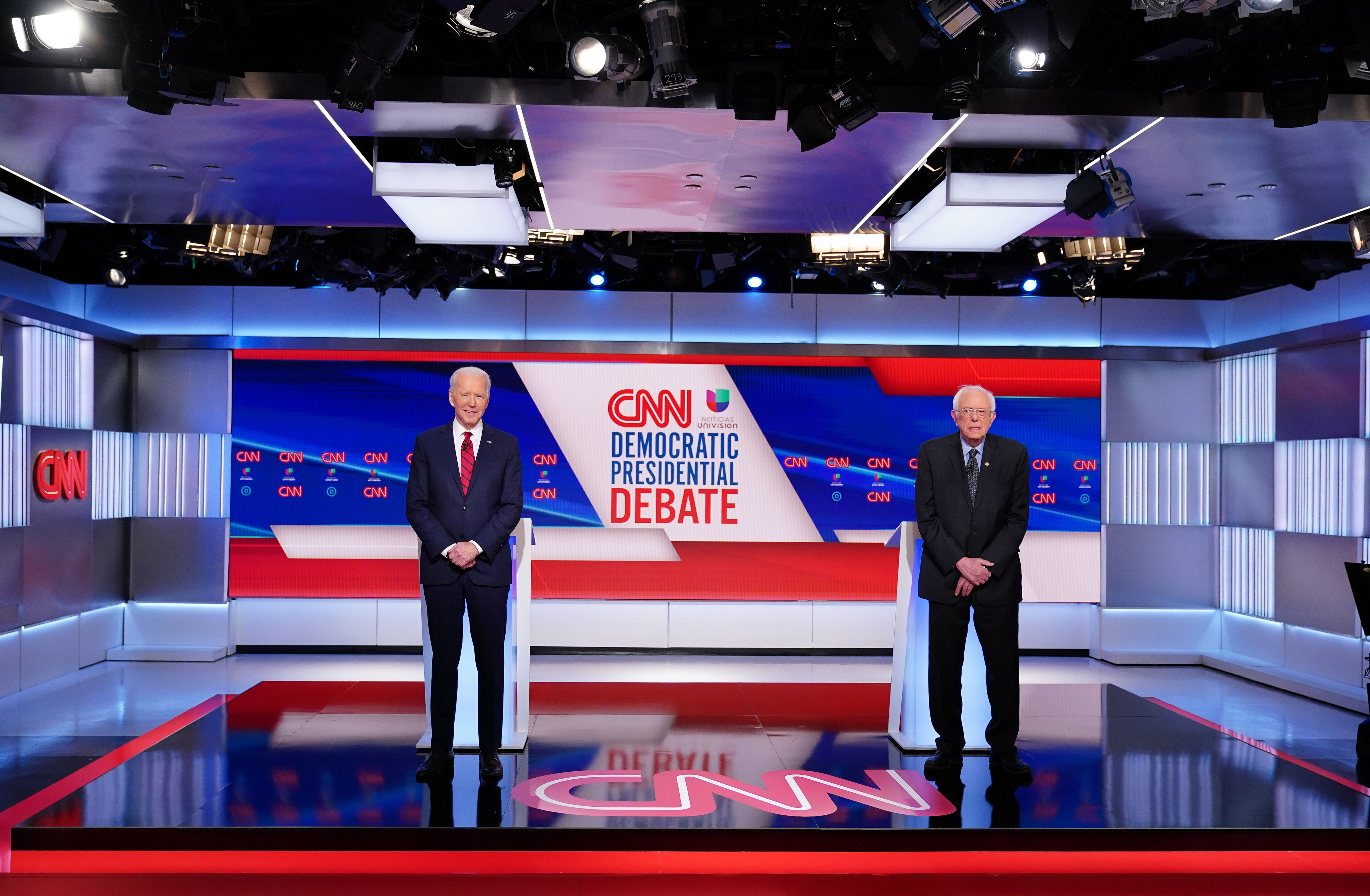The pragmatist vs. the purist
It turns out Bernie Sanders responds to coronavirus the same way he responds to everything else


A free daily email with the biggest news stories of the day – and the best features from TheWeek.com
You are now subscribed
Your newsletter sign-up was successful
For all but the opening 20 minutes and concluding moments of the first one-on-one debate between former vice president Joe Biden and Vermont Sen. Bernie Sanders, a viewer transported from the recent past would never have known that the country and the world are in the midst of a pandemic, that the U.S. is currently in a state of emergency, and that the global economy is tottering on the verge of a deep recession caused by public-health measures required to combat the spread of the coronavirus.
Which is to say that the debate seemed utterly normal and, for that very reason, oddly cut off from the anxieties dominating the world around it.
For the 11th time since last June, candidates squared off to fight about the present direction of the Democratic Party and the future direction of the country. On Sunday night, that conflict boiled down to a fight over whether to embrace pragmatism (Biden) or purity (Sanders). That's an important argument to have, and it's one that Biden easily won. Whether the way the candidates went about advancing their respective positions helped or hurt the party's image in the minds of voters is another matter.
The Week
Escape your echo chamber. Get the facts behind the news, plus analysis from multiple perspectives.

Sign up for The Week's Free Newsletters
From our morning news briefing to a weekly Good News Newsletter, get the best of The Week delivered directly to your inbox.
From our morning news briefing to a weekly Good News Newsletter, get the best of The Week delivered directly to your inbox.
For much of the evening, it felt like watching a long-standing feud between eternally warring clans, with each side seeking to advance its position by referring to long-forgotten legislative battles. Because Sanders is an ideologue, he can point to his own impressive record of consistency: he's always been a democratic socialist who dislikes capitalism, big business, and much of American foreign policy, and he's usually voted accordingly. Because Biden is a pragmatist who is uncomfortable trying to explain the workings of his shifting prudential calculations at various moments during his 35 years in the Senate, he often sounds unsure of himself and sometimes bends the truth about his record to minimize the inconsistencies.
This dynamic played out several times throughout the evening — about Biden's record on Social Security reform; about his newly expressed support for Elizabeth Warren's bankruptcy bill, which reverses elements of a 2005 law that Biden originally championed; about Biden's support for the Iraq War. Those were Biden's weakest moments of the evening. But they were also times when the debate got deepest into the weeds — and when viewers who didn't follow the intricacy of the policy details and disputes at least discerned that Sanders was savaging Biden for being too moderate even when his current position is further left than it used to be. It's hard to imagine that hurting the former vice president.
And that points to what may prove to have been Sanders' greatest weakness — on Sunday night, but perhaps going all the way back to the start of the race.
Sanders knows what he thinks. That health care is a crisis and that we need to respond accordingly. That inequality is a crisis and that we need to respond accordingly. That the influence of billionaires on our politics is a crisis and that we need to respond accordingly. That climate change is a crisis and that we need to respond accordingly. That American immigration policy is a crisis and that we need to respond accordingly.
A free daily email with the biggest news stories of the day – and the best features from TheWeek.com
But what about the colossal incompetence, mendacity, and maliciousness of the Trump administration? Or the distinctively scary potential epidemiological and economic consequences of the coronavirus pandemic? Sanders is certainly willing to treat them as crises, too, and to insist that we need to respond accordingly. But what stood out in Sunday night's debate is how eager he seemed to de-emphasize the special importance of these problems and to fold them into his overarching narrative of health-care and economic crises.
To most Americans, who likely consider the threat from COVID-19 uniquely pressing and Trump's awfulness newly worrisome, this probably looked like the distinctive aloofness of the political radical. Sanders is absolutely certain he knows both what's wrong with the world and how to fix it, and whatever happens in the headlines just reinforces that certainty.
If Biden were more nimble on his feet, he would have used every opportunity in the debate to pivot back to coronavirus and Trump, and the exceptional threat that both of them pose to the country, nailing home the message that competence and pragmatic flexibility are more valuable political virtues than ideological fervor and the robotic and irresponsible invocation of "revolution" in every political season.
As it was, Biden did just fine. He sounded sober and decent for much of the time, lapsing only occasionally into the hectoring sputter of defensiveness that has marked so many of his debate performances over the past nine months. It wasn't great, but it was good enough to remind viewers that he'd make a better president than the guy who repeats the same stock phrases every time we see him.
Want more essential commentary and analysis like this delivered straight to your inbox? Sign up for The Week's "Today's best articles" newsletter here.
Damon Linker is a senior correspondent at TheWeek.com. He is also a former contributing editor at The New Republic and the author of The Theocons and The Religious Test.
